By KATIE EUBANKS
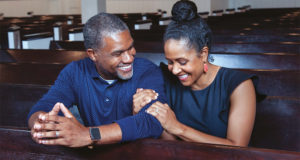
Elbert and Karen McGowen
Loving each other and all God’s people
Elbert and Karen McGowan flirt like teenagers during our cover shoot. He can’t keep his eyes off her, and very nearly can’t keep from smiling. When the photographer asks them to “look at each other,” sparks fly, and she laughs.
They’ve been married for 16 years, and have known each other for 24.
They met in 1996 at a program for graduating high-school seniors at Alabama A&M University. He was from Jackson, and she was from Akron, Alabama. They wound up at two different colleges but stayed in touch throughout undergrad.
“Then it just sort of went radio silent,” Elbert recalls.
He got a job at GE Aircraft Engines in Cincinnati, Ohio. She went to pharmacy school in Tallahassee, Florida.
They’d both grown up in church, but neither of them was saved.
While Elbert was working at GE, God started convicting him of his sin and his need for Christ. Elbert’s mother and Steve Lanier, a friend from Trinity Presbyterian Church in Jackson, pointed Elbert to a church in the Cincinnati area. He started reading his Bible, started “thinking about spiritual things,” he says.
“This was right around 9/11. (Singer) Aaliyah had died in a plane crash. I had a friend stabbed and killed. Another friend died in a car accident. And I just thought, wow, life is fragile.
“I read Galatians 2:20 — ‘I have been crucified with Christ. It is no longer I who live, but Christ lives in me. And the life I now live in the flesh, I live by faith in the Son of God, who loved me and gave himself for me.’
“It was beautiful but sobering. We all try to live up to God’s standard. But if that were possible, then Jesus died for no reason. In fact, it’s not possible (to meet God’s standard). Jesus died to do what we could not do.
“That’s when I think I trusted in the Lord.”
Around that same time, Karen came to Christ in a similar way, she says. “It was through a lot of — just a coming to the end of myself. I thought I had it all together … and the Lord just kind of knocked me off my personal horse (and said), ‘Now do you see your need?’”
After meeting God, Karen and Elbert met each other again.
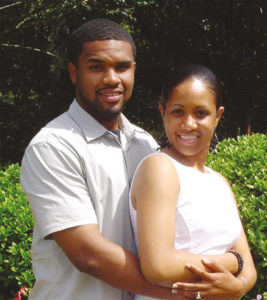
Elbert and Karen in an engagement portrait from 2004.
Replying to a 2-year-old email
“I shot her an email,” Elbert says.
More accurately: “I replied to a very old email.”
Karen explains that her housing situation would change when she interned at CVS in the summers during pharmacy school — and since she had no cell phone, she’d email her new landline number to all her contacts. In 2001, Elbert was on that email.
Two years later, he replied.
“I opened it, because I was always fond of Elbert,” Karen says. “He was always a sweet guy. … And I shared my contact information again. And we’ve been talking ever since.”
“And we’ve been talking since then,” Elbert says.
(FYI, Elbert and Karen were interviewed separately — which makes their nearly identical choice of words even sweeter.)
‘I told her I’m not a preacher type’
After experiencing the grace of Christ, Elbert couldn’t keep from sharing Him with others. He witnessed door to door through his church; witnessed to his direct reports at work; witnessed to kids from a local Boys & Girls Club, whom he took on tours at GE.
He also got involved in prison ministry and his church’s young adults ministry, and was discipled by godly men.

A memento from Elbert’s days at GE Aircraft Engines, where he was working when he met the Lord.
“I was working third shift (night shift at GE) as a production supervisor. In the daytime, I was driving to the prison and taking teams out at the church,” Elbert recalls. “I can remember wanting to do ministry but also needing to make a living. So I just lived on little sleep.”
One day he overheard Karen telling her sister on the phone, “Girl, I think I’m going to be marrying a pastor.” But despite the fire God had lit in him to share the gospel, he didn’t think he’d be doing it as a full-time minister.
“I told her I’m not a preacher type,” he says.
“But she said three things: 1. ‘If God calls you, we’ve got to go.’ 2. ‘I’ll go wherever God leads you.’ 3. ‘God will provide.’ This was the woman I was about to marry. That was confirmation to at least explore (the idea).”
Steve Lanier, the same friend who’d helped Elbert find a church in Ohio, connected him with admissions at Reformed Theological Seminary (RTS) in Jackson. Elbert toured the campus but was still torn. He had a steady income at GE. He told another friend: “If I move to Jackson, I have to trust the Lord.”
But that was the whole point.
The day Elbert and Karen decided to move to Jackson, she got a call from Walgreens about a job. A house next-door to Redeemer Church PCA, the new church plant out of Trinity Presbyterian, also became available.
“Those things didn’t happen until we committed,” Elbert says.
‘He just kind of wrecked our world’
In June 2004, soon after marrying, Elbert and Karen moved to Jackson. He and his father started a landscape company. Elbert cut grass and interned at Redeemer while attending seminary at RTS.
As Elbert entered his third and final year of seminary, someone asked if he’d ever thought about starting a chapter of Reformed University Fellowship (RUF) at Jackson State University.
Elbert asked Karen about it, and she suggested they fast and pray. Through that, God gave them a desire to reach college students, especially at HBCUs (historically black colleges and universities), which they both had attended (Elbert at Alabama A&M, Karen at Stillman College and Florida A&M).
So the McGowans went through the process of starting an RUF chapter at Jackson State.
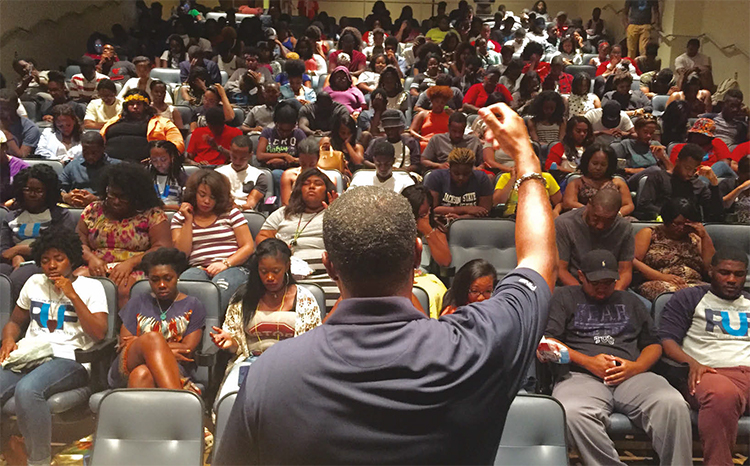
Elbert leads students in prayer at Reformed University Fellowship (RUF) at Jackson State University. He and Karen served at Jackson State for nine years before he became pastor at Redeemer.
Karen says she and Elbert’s own testimonies made them that much more passionate about college ministry:
“Because of our own lack of pastoral type of oversight at that age — we personally know Satan’s attack on our young adults, right? (We know) all the temptations and struggles they face,” she says. “So having the opportunity to kind of fill that gap and serve students in that way, it was a blessing.
“And every now and then they’ll call, or we’ll run into them, just seeing how the Lord is using them across the world … It’s just been sweet. It’s really rewarding when you can kind of see the fruit of your labor.”
But the time went by fast, Elbert recalls:
“Students come in and you look up, and they’re graduating. You look up, and they’ve bonded to a peer group. You look up, and it’s December break.”
One day he and Karen looked up, and they’d been at RUF for about seven years.
“There was no thing that happened, but (we had) the idea of, is it time for us to start another work on another black campus, or plant a church?”
Then he had a meeting with Mike Campbell, the founding pastor at Redeemer, where Elbert and Karen were still active members. Mike said he felt called back to Miami, where he’d pastored before, and that God might be calling Elbert to be the pastor at Redeemer.
“He just kind of wrecked our world,” Elbert says. He was scared. He’d never wanted Mike’s job.
‘It’s obvious that we’re different’
As with the move to Jackson, God was calling the McGowans to take a step of faith.
“After a couple weeks of praying and spending time in solitude with the Lord, He awakened this love (in me) for the people here (at Redeemer) in a more tender way,” Elbert says.
“Then it became, I don’t want to be anywhere else.”
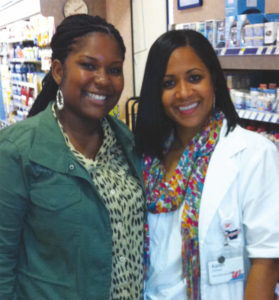
Karen (right) gets a visit from former Jackson State student Starlencia H. Hinton, who was part of RUF when Karen and Elbert led that ministry.
He was still afraid of messing it up, he says. Afraid of not being mature enough.
“You go from a deeply homogenous group of 99 percent black college students at Jackson State, and then to be in a setting where people are different, and it’s obvious that we’re different, that was hard,” Elbert says.
Redeemer is an intentionally multiethnic church in one of the most diverse neighborhoods in Jackson. Racially, politically and socioeconomically, folks at Redeemer are all over the spectrum.
Among Elbert’s other concerns were “the expectations for a first lady,” he says.
Fortunately, “the search committee did a beautiful job of telling Karen, ‘We have no expectations of you, other than loving this man and caring for your family.’” In other words, she didn’t have to host every Bible study and be present at every ministry meeting.
That doesn’t mean she never puts pressure on herself.
To the church members who were there when Elbert became pastor in 2016, “I’m just still Karen,” she says. She and Elbert had been at Redeemer for a while. But the church has grown in the past four years. New people have come in.
“It’s definitely self-inflicted, (but) I would think, ‘What do these people think of the pastor’s wife?’ I’m not just Karen to them. So it’s a struggle sometimes,” she says.
“And I have people to kind of constantly remind me, ‘Hey, you’re not here to meet everybody.’ But the struggle is just trying to make sure (everyone knows) that they are loved and cared for.”
For her part, she’s available to meet with women whenever there’s a need, she says.
“It’s a team effort.”
Prioritizing the family
Before the McGowans can minister effectively to their church, they have to love each other and their kids: Karis, 14, and Tripp (Elbert McGowan III), 11.
Between Elbert’s duties at Redeemer, Tripp’s baseball games, Karis’ tennis games and piano lessons, and Karen’s part-time job as a relief pharmacist for Walgreens, the family calendar is packed.
Karen didn’t initially want to do retail pharmacy, but it wound up being what she needed, she says. She gets to help all kinds of customers in cities anywhere within 60 miles of Jackson — and if the drive home is long, “it gives me a little time to decompress,” she says with a laugh, “and get back into (my) mom role.”
At the McGowan dinner table, phones are not allowed. Instead, Elbert and Karen and the kids check in with each other and talk about their day. They have some form of family worship on a regular basis (they’re currently reading through Revelation).
Once a week, they have an intentional family night. They take turns picking the meal and the activity — and even if it’s something only one person likes, everybody has to participate, Karen says. It encourages that person and helps unify the family.
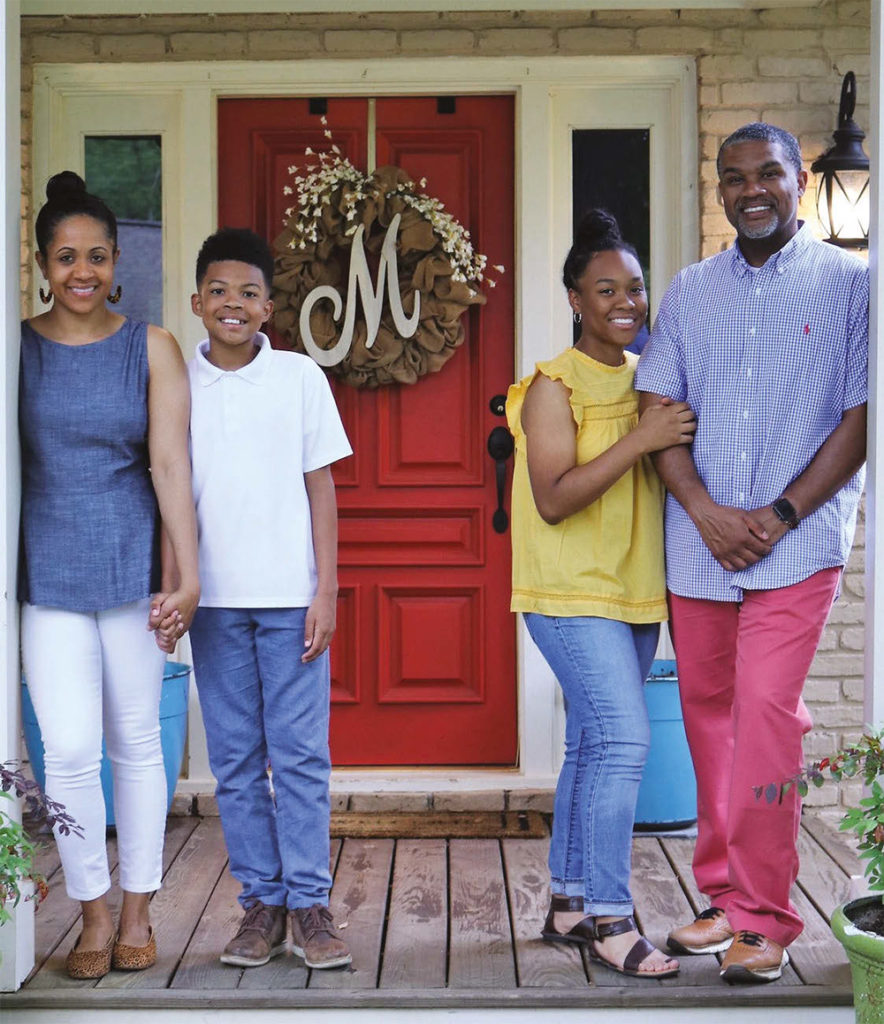
From left: Karen, Tripp (Elbert McGowan III), Karis, and Elbert McGowan, Jr.
Tough conversations in 2020
If family unity requires effort, imagine leading a church.
Now make it a multiracial church. In a year like 2020.
Just two days after the World Health Organization declared COVID-19 a pandemic, Breonna Taylor was killed in Louisville, Kentucky. Two months after that, George Floyd was killed in Minneapolis. Since then, protests and riots have happened across the country.
“One of the first things I’ve tried to do is remind our people that everything we’re experiencing (this year) isn’t new,” Elbert says.
“It feels different because it’s compacted, (but) you think about the Spanish flu (in comparison to COVID-19). You think of Revelation … This vision John sees, famines, wars, inflation … I don’t think that’s just a future time of tribulation. I think that’s now.”
People have been killing their fellow man from the beginning. “We’re on track for a record year of murders in Jackson right now,” he says.
“(That lack of concern for human life) manifests itself citizen to citizen, and it goes up to some police officers and how they treat citizens as well.”
Ultimately, that injustice and hatred go back to rebellion against God, he says. “When we rebel against the Lord, we won’t rightly love our neighbor.
“It may feel (new) because it’s in our lifetime, but when you look at what our grandparents endured, and people of color enduring slavery and Jim Crow — this doesn’t feel new to me. It (just) feels like something is very wrong with this world.”
Elbert says it’s crucial to remind his church that God’s kingdom is diverse, and that that’s a good thing. He points out the stark differences between Jesus’ 12 disciples, such as Matthew the tax collector, who worked for the oppressive Roman regime, and Simon the zealot, who wanted to overthrow that regime by any means necessary.
“Something captivates them about Jesus that changes them. Those (other) things become secondary, and they’re able to gather around a meal and not be an elephant or a donkey,” Elbert says.
“He’s building this kingdom that doesn’t look like this world. As long as we take our cue from this world, we’ll be divided.”
Elbert claims the church already has unity, in a sense:
“When you pull back the veneer, we have the same need. We’re all deeply sinful, deeply biased, deeply flawed. And our common need is to be reconciled to God,” he says.
Reconciliation with God automatically reconciles us to each other. We just have to seek God’s help in living that out.
“Christians can engage in these situations with love, and humility, and I even think repentance, man.”
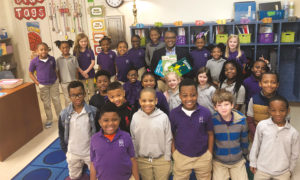
Elbert, aka “Pastor El,” reads to students at The Redeemer’s School, an urban Christian school housed at Redeemer Church.
Karen explains what some of that has looked like at Redeemer:
“(The church leadership has) done a good job of, one, informing everyone, making sure everyone is aware that (racial injustice) is not a made-up type of thing. And … there are things that we do, whether it’s knowingly or just kind of unaware of … to contribute to this, or that we can do to combat it,” she says.
“And I’ve had conversations personally with women where we’ve had lunch and we’ve discussed this, black and white. I think for me … we just kind of see our roles as moms, our role is to make sure our children understand this, and that we don’t raise children who are racist and who hate,” she says.
“People have admitted to struggling with this, whether you’re black and you feel like not enough is being done (to combat racism), or you’re white and you feel like this is too much attention given to this thing … It’s been a challenge at home and (at church), but people are so willing to reach out and have uncomfortable conversations.”
Elbert knows he and Karen were put in place, both in their family and at Redeemer, to have those conversations. And despite the feelings of insecurity that may bring, he remembers something Jesus told those 12 disciples: “You didn’t choose Me, but I chose you.”
“He knew exactly who He was choosing,” Elbert says. “That gives me hope.”
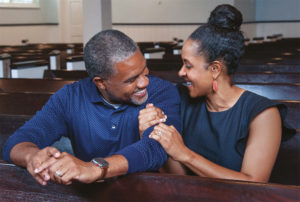
“I shared my contact information again. And we’ve been talking ever since.” – Karen McGowan

